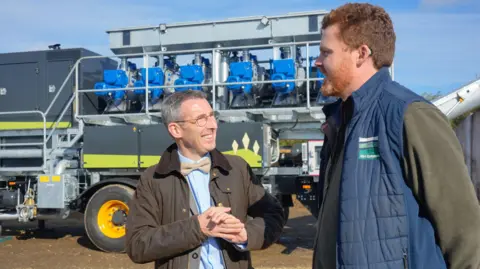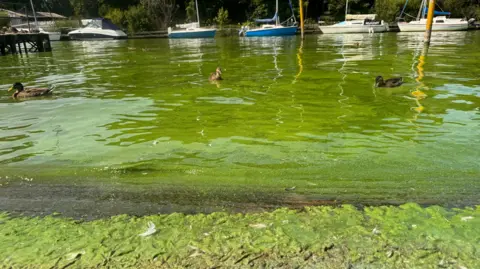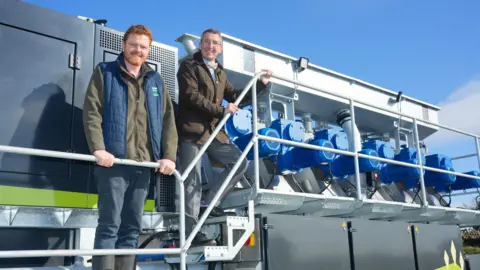Slurry project a 'significant milestone', says minister
 DAERA
DAERAA County Down company has been awarded £4m over three years to help reduce excess phosphorus coming from slurry.
Phosphorus largely coming from agricultural runoff contributes to high nutrient levels in Lough Neagh, which help create the conditions for blue-green algae to bloom.
The Sustainable Utilisation of Livestock Slurry (SULS) programme was launched by the Department of Agriculture, Environment and Rural Affairs (Daera) in 2023.
BH Estates near Dundonald was among six companies selected in Phase One of the Small Business Research Initiative competition to develop proof of concept solutions for removing excess phosphorus in cattle and pig slurry.
A report in 2020 found Northern Ireland has an annual 6,000t surplus of phosphorus.
It will now use the funding it has been awarded in Phase Two to scale up its Farm2Export project.
Phosphorus is one of the most scarce elements in nature and plays a key role in soil fertility and agricultural productivity.
Reliance on fossil fuels

The project uses large mobile separators to divide slurry into liquid and solids for extraction of nutrients including phosphorus, and production of feedstock for anaerobic digestion.
Funding from Daera will allow additional nutrient separation equipment to be acquired.
The Daera Minister Andrew Muir said the announcement of the award was “a significant milestone” with the “potential to radically change the way nutrients are managed by the farming community”.
And he said it would support reduction in reliance on fossil fuels, reduce the need for imported fertiliser and demonstrate the potential to improve water quality “if rolled out on a much larger scale”.
After separation, nutrients including phosphorus and nitrogen may be processed for use as fertiliser or exported if not needed locally.
Manure can then be used in anaerobic digestion to generate renewable energy.
The biomethane the process produces has already been directly injected into the gas network in Northern Ireland in a pilot project in County Tyrone.
'Win-win for farming, food processors and the public'
 DAERA
DAERAJack Blakiston Houston, managing director at BH Estates said he hoped their system would “deliver a win-win for farming, food processors and the public with regards to nutrient management in both the agri-food and energy sectors in Northern Ireland”.
The SULS project is included in the Lough Neagh Action Plan, approved by the Executive in July 2024.
This is the first announcement in Phase Two of the competition, with more expected to be announced.
